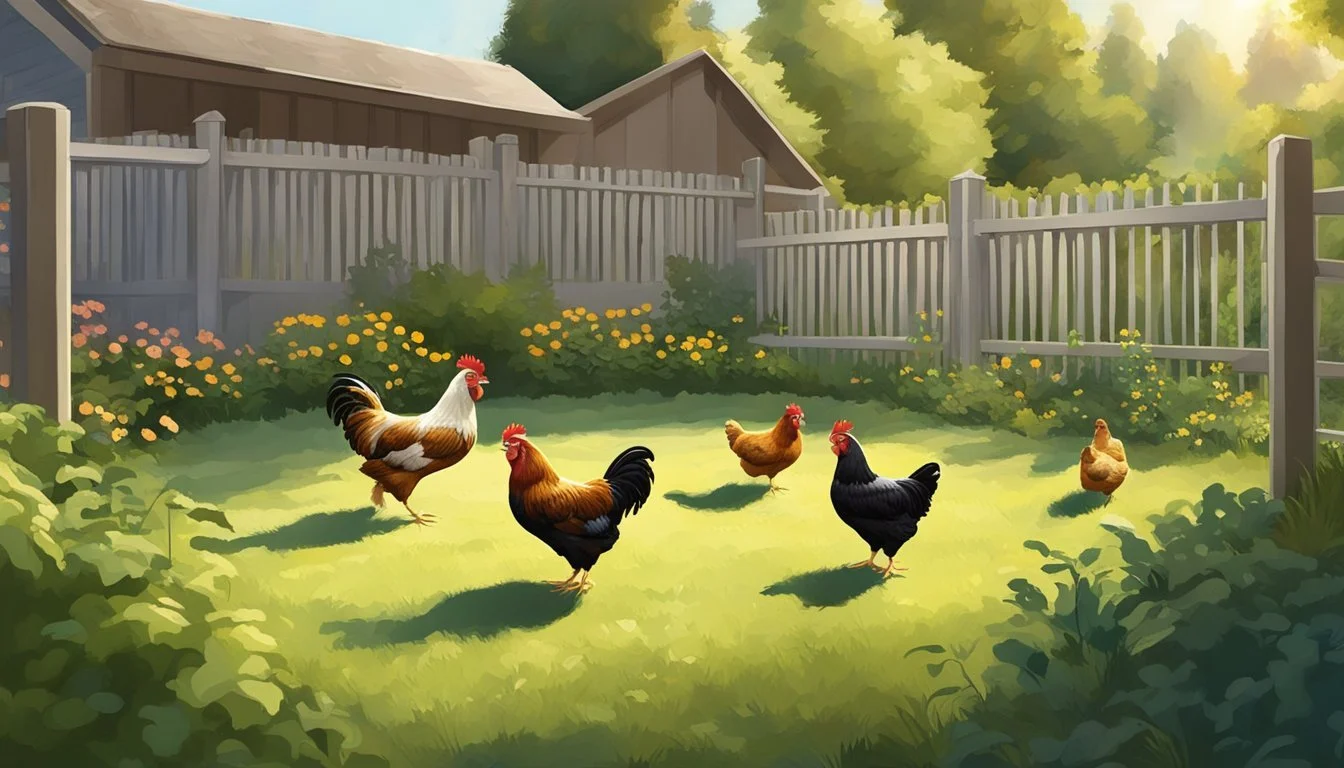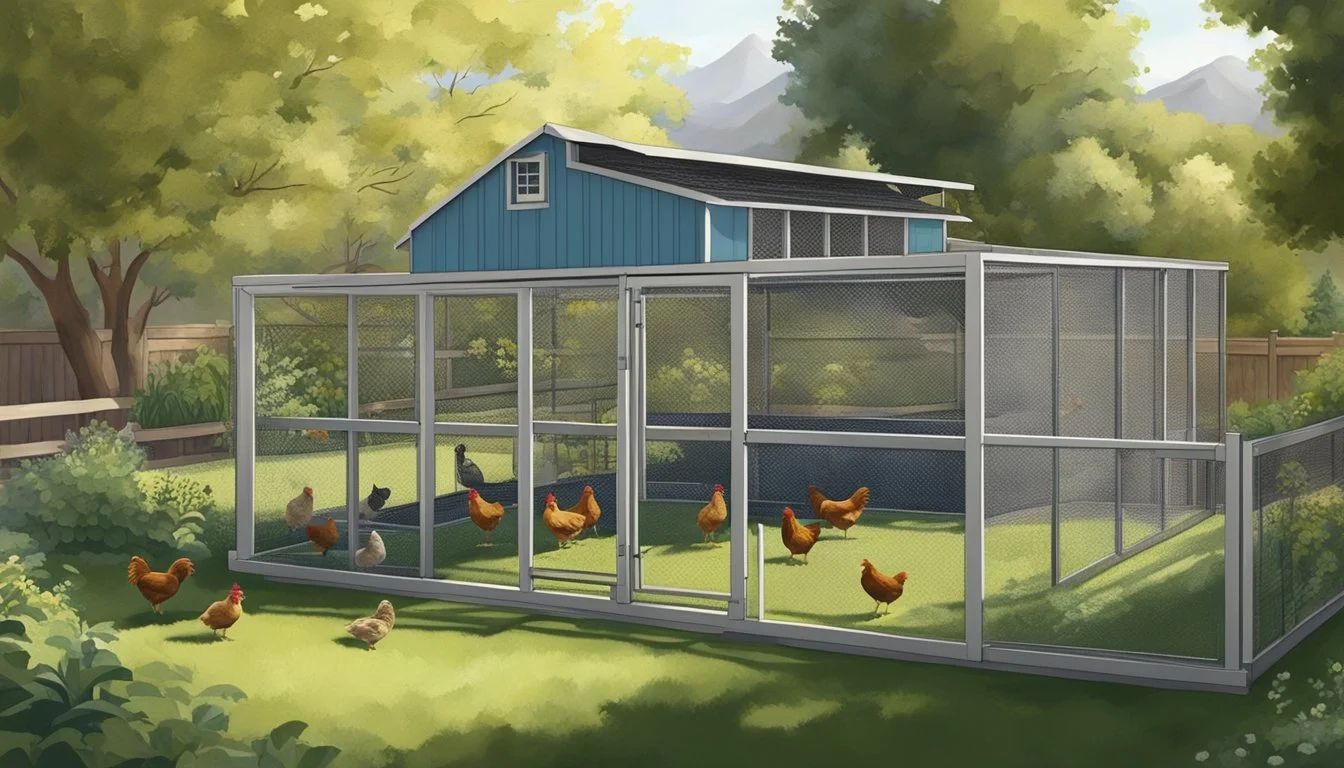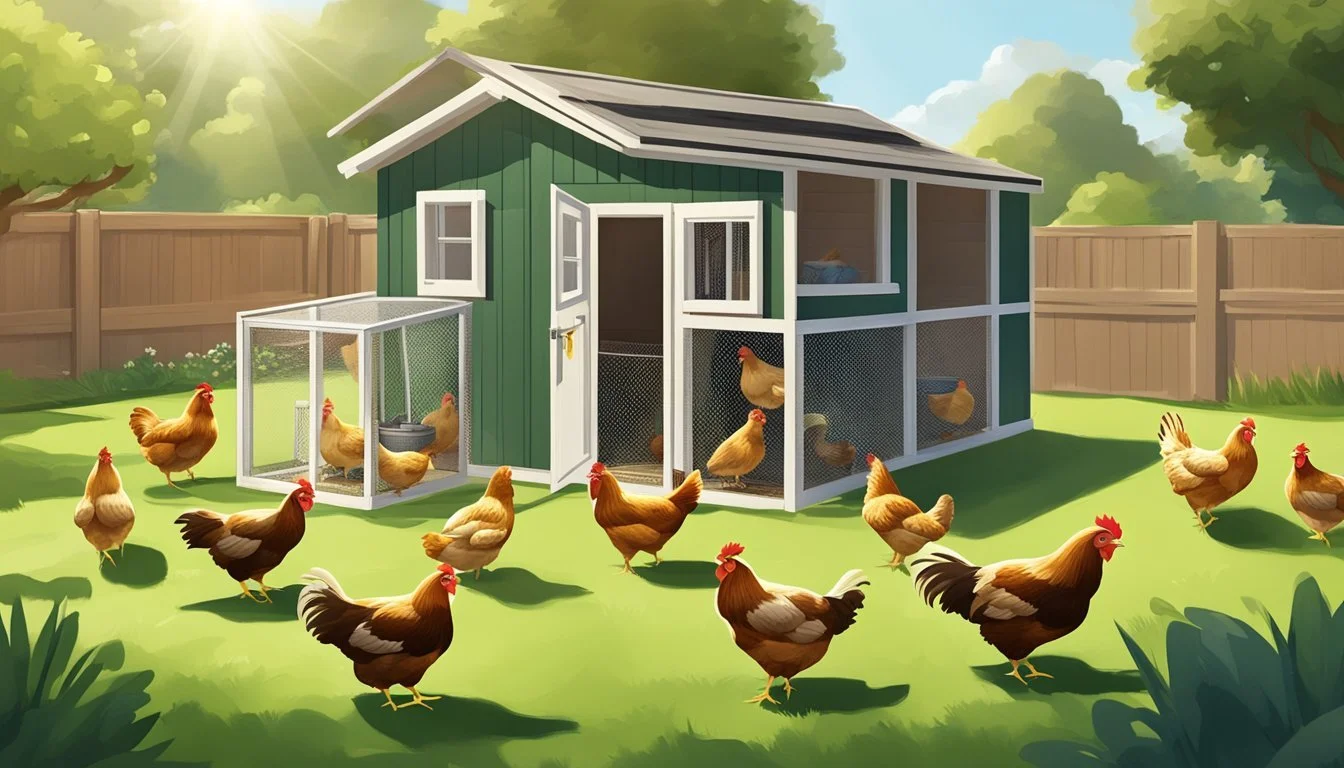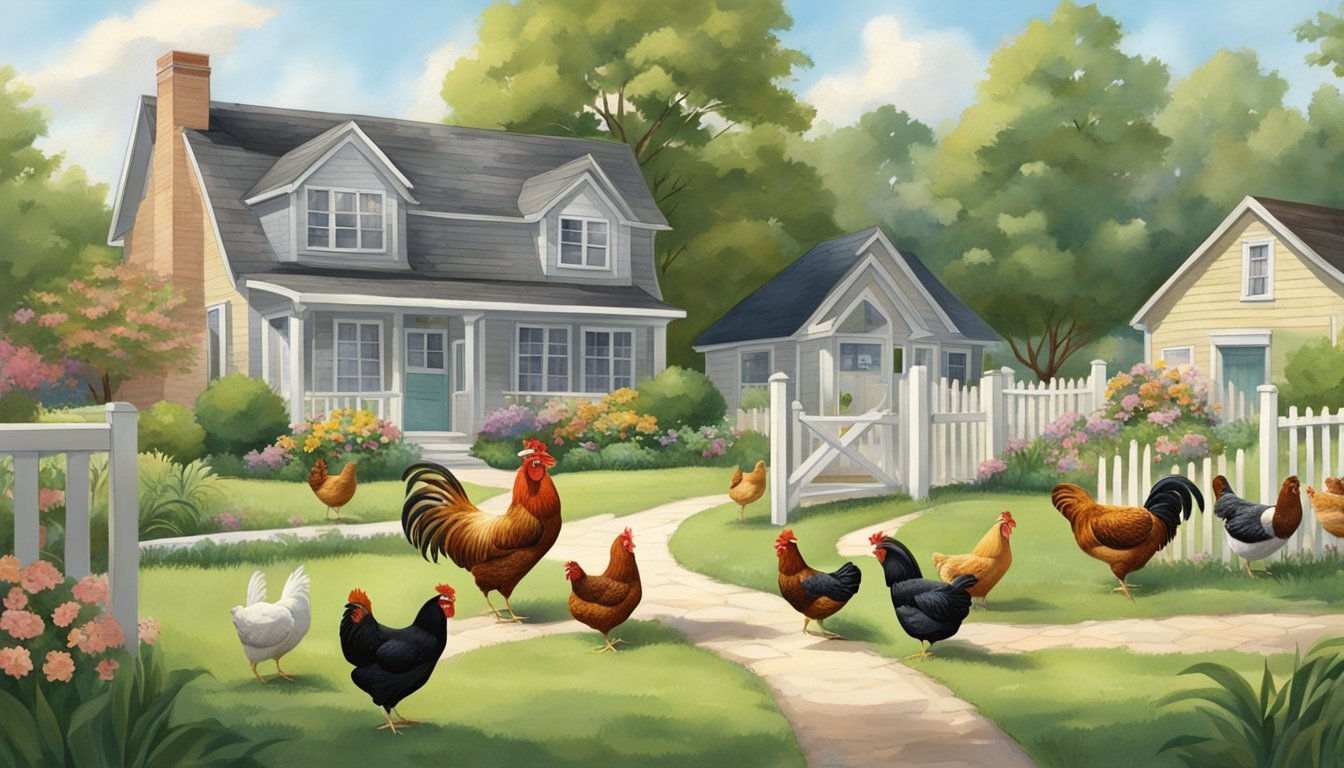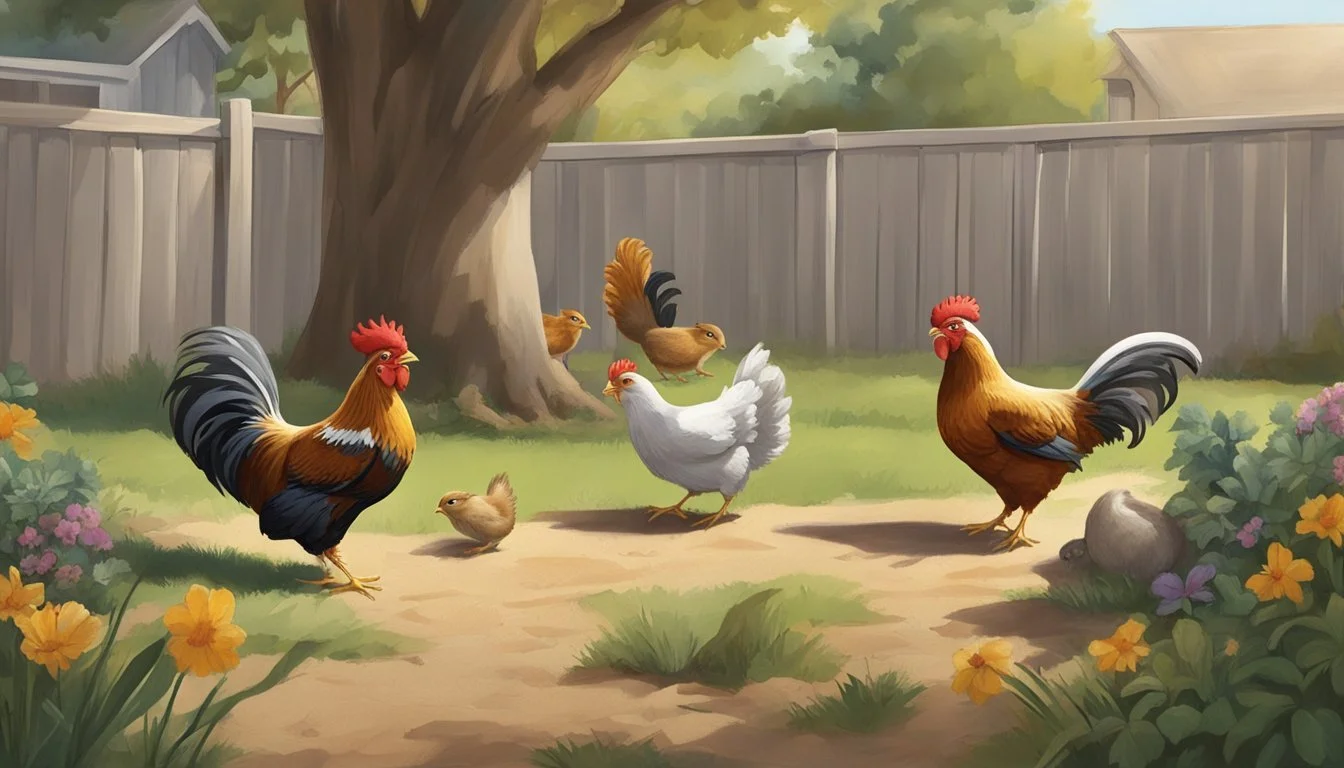Keeping Backyard Chickens in Moreno Valley, CA
Essential Tips for Beginners
Backyard chicken keeping has become an increasingly popular practice, offering residents the joys of fresh eggs, natural pest control, and the pleasure of caring for chickens. However, in Moreno Valley, California, the city has specific regulations that residents must follow. It is important for potential and current chicken owners to be aware of these regulations to ensure they are in compliance with local laws.
In Moreno Valley, roosters are prohibited in any part of the city, which aligns with the common goal of reducing noise in residential areas. Other livestock, including chickens, are allowed but are regulated by zoning laws. Residents should consult with the Planning Division to check if their area is zoned appropriately for the keeping of chickens and to understand any specific requirements or limitations.
While the city upholds regulations to maintain public health and peace, it also supports urban agriculture to an extent. Homeowners must be diligent in maintaining a clean and sanitary environment for their chickens and must manage their flocks responsibly to prevent any nuisance to the community. It is the responsibility of each chicken owner to adhere to the city's expectations and to respect their neighbors' rights to a peaceful living space.
Understanding Local Regulations
When keeping backyard chickens in Moreno Valley, CA, residents must navigate a complex web of local, county, and state regulations designed to maintain community standards and public health.
Moreno Valley Zoning Laws
In Moreno Valley, zoning laws dictate the specific allowances and restrictions for keeping animals on residential properties. These local regulations are enacted by the city council and are detailed in the municipality's City Code. Residents must check the current zoning for their property to determine if the keeping of chickens is permissible.
Riverside County Regulations
Riverside County has its own set of regulations that complement city ordinances within its jurisdiction. For instance, the county requires that roosters must be housed in acoustical structures to minimize noise levels, and permits are mandatory for keeping roosters, with costs varying based on the number:
1-6 roosters: Permit required, no fee
7-10 roosters: $500 annual permit fee
11+ roosters: Permit required, fee to be determined
These measures are in place primarily to address noise concerns and to ensure there is no disruption to the surrounding community.
California State Requirements
The state of California sets overarching requirements for keeping backyard chickens that all municipalities, including Moreno Valley, must follow. These state regulations are designed to safeguard against public health risks and animal welfare issues. Local laws often work within the framework set by the state to address specific community needs and can vary significantly from one municipality to another. Residents should ensure they adhere not only to Moreno Valley and Riverside County regulations but also to California state law.
Legal Considerations for Raising Chickens
When raising chickens in Moreno Valley, CA, residents must comply with specific legal requirements. These include obtaining the appropriate permits, adhering to limits on the number of chickens, observing setback requirements from property lines, and regulations regarding the keeping of roosters.
Permitting Process
In Moreno Valley, residents are required to obtain a permit if they wish to keep chickens on their property. The permitting process involves submitting an application to the local authorities, which must include detailed plans of the coop and run areas. The authorities will review the application to ensure compliance with local regulations.
Number of Chickens Allowed
The specific number of chickens allowed varies based on the size of the property. Properties smaller than one acre are typically subject to more stringent limitations. To avoid fines, residents must familiarize themselves with the allowable number of chickens for their property size.
Less than one acre: Specific number restrictions apply.
One acre or larger: Typically, more chickens are allowed.
Setback Requirements
Setback requirements dictate the minimum distance chicken coops and runs must maintain from property lines and the main residence. These requirements are in place to mitigate noise, odor, and potential disputes with neighbors.
Front property line: Chicken coops must be behind the front property line.
Rear and side property lines: There are predetermined setback distances that must be observed.
Rooster Regulations
Regulations concerning roosters are more stringent due to potential noise issues. While roosters are allowed, they must be kept in an acoustical structure at night to minimize crowing sounds.
Number of roosters: A permit is required, with differing requirements based on the number of roosters.
Fees: Fees for permits vary, with a tiered fee structure based on the number of roosters.
Housing Chickens Safely
In Moreno Valley, CA, ensuring the safety of backyard chickens involves careful selection of the coop, protection against predators, and maintaining a clean environment for chicken health and neighborly relations.
Selecting a Suitable Coop
When choosing a chicken coop for a residential area, size and ventilation are key. The coop should provide ample space for the chickens to move freely and be well-ventilated to minimize odors. It's important that the coop is built with sturdy materials to withstand weather and discourage theft. In accordance with local ordinances, coops must be placed at least 10 feet from property lines.
Protecting Against Predators
Predators can be a significant threat to backyard chickens. To safeguard them, the chicken coop should be equipped with secure locking mechanisms and reinforced with predator-proof wire. Regular inspections for potential breaches or damages are essential. Overhead coverage is also advised to protect against aerial predators.
Maintaining a Clean Environment
A clean coop is vital for the health of the chickens and to prevent any unpleasant smells that could disturb neighbors. The coop should be cleaned regularly, with waste disposed of properly and feeders kept tidy to avoid attracting pests. A regular cleaning schedule should be established to ensure the coop remains a healthy and odor-free environment.
Chicken Health and Welfare
In Moreno Valley, CA, keeping backyard chickens healthy and well requires careful selection of breeds, proper care from the chick stage, and consistent measures to prevent diseases.
Choosing the Right Chicken Breeds
When selecting chicken breeds for a backyard flock in Moreno Valley, potential owners should consider the climate, space, and their egg-laying expectations. Ameraucana and Barred Rock are popular breeds known for their hardiness and docile nature. The Ameraucana is especially favored for its blue eggs, while the Barred Rock is appreciated for its consistent egg production and adaptability to various climates.
Caring for Baby Chicks
The first weeks of life are critical for baby chicks. They should be kept in a warm brooder with temperatures starting at around 95 degrees Fahrenheit, decreasing by 5 degrees each week until they’re ready for outside temperatures. It's essential to provide ample space to prevent overcrowding and to ensure clean water and proper chick starter feed are always available to safeguard their health.
Preventing Diseases
Prevention is key to maintaining a healthy chicken flock. Owners should implement biosecurity measures such as:
Regular cleaning and disinfection of the coop and equipment
Quarantine for new or sick birds
Vaccination where applicable
One specific health concern is Salmonella, a bacteria that can affect both chickens and humans. Good hygiene practices, such as washing hands after handling chickens or their eggs and avoiding bringing birds into the house, can reduce the risk of Salmonella transmission. Regular health checks for hens and the entire flock also help to identify and address issues early.
Community Relations and Considerations
Keeping backyard chickens in Moreno Valley, CA requires careful attention to community relations. Homeowners must balance their own enjoyment of poultry keeping with the rights and concerns of neighbors and adhere to guidelines set forth by homeowner associations.
Managing Waste and Odors
Proper Waste Management: Backyard chicken enthusiasts must implement regular waste collection and disposal methods to prevent odors. Best practices include:
Daily removal of droppings from coops.
Weekly replacement of bedding material.
Use of a compost bin for organic recycling, ensuring it's a safe distance from neighboring residences.
Odor Prevention: To minimize potential odors:
Provide adequate ventilation in chicken coops.
Use odor-neutralizing agents like lime or baking soda sparingly to maintain a neutral pH balance.
Addressing Neighbors' Concerns
Neighboring residents may have various concerns regarding backyard chickens, from noise to property values. To address these:
Hold an open dialogue with neighbors to hear concerns and seek solutions.
Construct soundproofing barriers if necessary to minimize noise.
Maintain the property and coop appearance to uphold neighborhood aesthetics.
Homeowner’s Association Rules
Local Regulations: Members of homeowner’s associations are subject to specific rules which may include but are not limited to:
Number of chickens allowed
Location of the chicken coop in relation to the house and property lines
Coop construction standards
Homeowner's Association Approval: Before getting chickens, it is crucial for homeowners to:
Review the CC&Rs (Covenants, Conditions, & Restrictions)
Obtain written permission if required by the association
Overall compliance with regulations and an active effort to accommodate community expectations help ensure that the practice of raising backyard chickens enhances the Moreno Valley community, including the San Gabriel region, without disturbance to others.
Additional Backyard Animals
In Moreno Valley, while chickens are commonly kept as backyard animals, understanding permits and cohabitation with other pets is essential for maintaining a compliant and harmonious backyard habitat.
Understanding Livestock Permits
Moreno Valley residents must adhere to zoning regulations for various types of animals considered as livestock. Besides chickens, common livestock such as goats and horses are regulated based on the zoning of the area. For instance, to keep certain quantities of roosters, a permit might be necessary, sometimes accompanied by a fee. It is crucial for residents to contact the Planning Division to determine the specific requirements associated with their property's zoning.
Roosters: Permit required; fees vary based on the number of roosters.
Other Livestock: Zoning regulations determine the keeping of goats, horses, and other animals.
Residents should confirm the current ordinances since policies regarding livestock can evolve.
Cohabitation with Other Pets
When keeping backyard chickens or other livestock, it is important to consider the impact on and from other domestic pets such as cats and dogs. Proper measures should be taken to ensure the safety and well-being of all animals involved. This could involve:
Secure enclosures to prevent escape or intrusion.
Training for dogs to behave appropriately around livestock.
Surveillance or separation to maintain peace among animals.
One should design their backyard space to accommodate the differing needs of each pet, ensuring they have adequate space and shelters respective to their species.
Local Perspectives on Backyard Chickens
In Moreno Valley, California, residents exhibit a range of opinions regarding the rearing of backyard chickens. The municipal ordinance regulates chicken-keeping based on the size of one's property, signaling the city's recognition of urban poultry as a point of interest among locals. Homeowners are permitted a certain number of chickens depending on their lot size, with a prohibition on chickens for lots under 10,000 square feet.
In the wider region, perspectives vary with each city's unique approach and regulation level. For instance, Los Angeles allows a reasonable number of hens without a permit, provided they are kept a certain distance from neighboring dwellings. San Diego has similar regulations, aiming to balance the desires of urban farmers with the concerns of other residents.
Neighbors often express concern over potential noise—specifically the crowing of roosters. This has resulted in strict regulations in some areas, such as Riverside, where permits and acoustical structures are required to keep roosters. Regulations ensure that the noise does not disrupt the community’s peace.
In cities like Oakland and Sacramento, the rules are fairly accommodating, reflecting a community that values local food sources and the joys of raising chickens. Conversely, cities such as Bakersfield, Long Beach, and Pasadena have their own sets of restrictions, highlighting the diverse viewpoints within each municipality.
Residents in areas like Anaheim and Brea are also guided by specific municipal codes establishing clear guidelines on how many chickens (excluding roosters) one can keep, underscoring a trend toward urban agriculture while also considering the interests and rights of the surrounding community.
City-Specific Guidelines
In Moreno Valley, individuals must adhere to specific city guidelines for keeping backyard chickens. The city's Planning Division should be contacted for precise information but generally, roosters are prohibited throughout the city. Regulations for other livestock like chickens, goats, and horses depend on zoning areas.
For residents considering urban chicken farming in other cities, regulations vary:
Adelanto: They have their own set of guidelines for backyard poultry.
Baldwin Park: Specific ordinances apply to the keeping of chickens within city limits.
Bellflower: Regulations here may differ from other municipalities.
Carlsbad: City regulations dictate how chickens may be kept.
Downey: Backyard chicken regulations must be confirmed with the city.
Gardena: The city has distinct guidelines for poultry keeping.
Garden Grove: Residents must consult city ordinances for rules on chickens.
Hawthorne: Guidelines are established for residents who wish to keep chickens.
Hesperia: The city provides its own regulations on the matter.
Lakewood: Keeping chickens is subject to city-specific ordinances.
La Mesa: The city outlines unique poultry-keeping regulations.
La Mirada: City guidelines dictate how residents can maintain backyard chickens.
Nipomo: This locality has specific ordinances pertaining to chickens.
Orange: Residents must follow the city's distinct rules on backyard poultry.
Rancho Cucamonga: Regulations for backyard chickens are set by the city.
San Clemente: There are specific city guidelines for keeping chickens.
Temecula: City ordinances lay down the law for chicken enthusiasts.
Victorville: Includes its own regulations regarding backyard poultry.
West Hollywood: Specific rules apply to urban chicken farming.
Residents of these cities should contact their local city offices or visit the city websites to gain detailed knowledge about keeping backyard chickens. It is important to ensure that all activities are within the legal parameters set by the respective city to avoid potential fines or penalties.
Getting Started
In Moreno Valley, CA, residents contemplating the addition of backyard chickens to their home must adhere to local ordinances, and understand the basics of coop construction to ensure the welfare of their poultry.
Introduction to Backyard Chicken Keeping
Backyard chicken keeping is a rewarding venture for Moreno Valley residents. It is essential for newcomers to be aware of the necessary steps involved in starting. They must familiarize themselves with local regulations, which include obtaining permits if planning to keep roosters, and ensuring coops are situated away from property lines to respect neighbors.
Key Steps for Beginners:
Research local chicken ordinances in Riverside County.
Join forums or local groups for new member introductions to the backyard chicken community.
Identify the specific needs and space available on your property for keeping chickens.
Building or Buying Your First Chicken Coop
Constructing or acquiring a coop is a critical step in chicken keeping. The coop should provide protection, space, and comfort for the chickens. Buyers should look for sturdy, predator-proof options, while builders must ensure materials and designs meet the chickens' needs.
Considerations for Coop Placement:
Proximity to Property Lines: Ensure compliance with local regulations regarding distance from neighboring homes.
Sunlight and Shade: Locate your coop to receive adequate daily sunlight while offering shade to prevent overheating.
Accessibility: Place the coop for easy access to feed and clean, maintaining a clean environment, as per California laws.
By adhering to these guidelines, residents can begin their journey in backyard chicken keeping with confidence and clarity.

